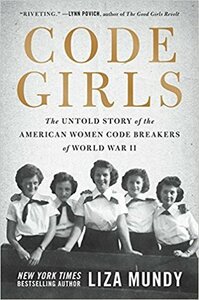Take a photo of a barcode or cover
760 reviews for:
Code Girls: The Untold Story of the American Women Code Breakers Who Helped Win World War II
Liza Mundy
760 reviews for:
Code Girls: The Untold Story of the American Women Code Breakers Who Helped Win World War II
Liza Mundy
informative
inspiring
slow-paced
informative
medium-paced
adventurous
informative
inspiring
fast-paced
informative
inspiring
medium-paced
dnf 25%. Fascinating subject but execution is so unbelievably boring
emotional
informative
inspiring
slow-paced
Though the accomplishments of these women is little known and worth celebrating, I struggled to keep with it. As an avowed fiction reader, I needed more character development and plot. The last 1/4 to 1/3 of the book had a bit more going on as the end of the war was underway, but overall found the book more suited for history and military buffs.
Well researched and touching.
Though she jumps a bit and sometimes you will get lost and need to reread a page or two, this book is remarkably well researched and well presented for anyone to pick up and read.
Though she jumps a bit and sometimes you will get lost and need to reread a page or two, this book is remarkably well researched and well presented for anyone to pick up and read.
This story about the "clandestine mail reading" business during WWII is a pleasure to read and very much in keeping with the recent spate of books about women's contributions to American history.
The book begins with a bit of background on the history of American cryptanalysis, which gained steam after WWI. Then came the unprecedented scale-up after Pearl Harbor, and the work that went into cracking the Japanese codes. I got a bit bogged down trying to understand the minutiae of how messages are encoded, and then how cryptanalysts worked backwards to try to gain entry into enemy messages. Mundy did a good job of explaining the process, but I hope that the final version of the book includes some pictures or illustrations to help readers understand (I read a pretty basic advance copy). I was very interested in the ways that the intelligence departments gained information in a sideways manner, for instance studying the patterns of communications traffic and the stylistic format of the messages. I wish that there had been more about code breaking in the European theater, but breaking Enigma appears to have been done primarily by machine rather than through human analysis. I was fascinated by the use of communications traffic to create a phantom army to confuse the Germans about D-day.
I love that we got to follow several women closely through the entire war, and that Mundy included detail about their personal lives as well as their war jobs. Mundy's writing is clear and readable, and the story she tells is first-rate. I got a little bit confused jumping back and forth between the Army and Navy code breakers, and back and forth in time, but Mundy generally provided enough context and detail to get me back on track. These were incredible women who helped provide desperately needed information to win the war.
FYI, I received a free advance copy of Code Girls through www.netgalley.com.
The book begins with a bit of background on the history of American cryptanalysis, which gained steam after WWI. Then came the unprecedented scale-up after Pearl Harbor, and the work that went into cracking the Japanese codes. I got a bit bogged down trying to understand the minutiae of how messages are encoded, and then how cryptanalysts worked backwards to try to gain entry into enemy messages. Mundy did a good job of explaining the process, but I hope that the final version of the book includes some pictures or illustrations to help readers understand (I read a pretty basic advance copy). I was very interested in the ways that the intelligence departments gained information in a sideways manner, for instance studying the patterns of communications traffic and the stylistic format of the messages. I wish that there had been more about code breaking in the European theater, but breaking Enigma appears to have been done primarily by machine rather than through human analysis. I was fascinated by the use of communications traffic to create a phantom army to confuse the Germans about D-day.
I love that we got to follow several women closely through the entire war, and that Mundy included detail about their personal lives as well as their war jobs. Mundy's writing is clear and readable, and the story she tells is first-rate. I got a little bit confused jumping back and forth between the Army and Navy code breakers, and back and forth in time, but Mundy generally provided enough context and detail to get me back on track. These were incredible women who helped provide desperately needed information to win the war.
FYI, I received a free advance copy of Code Girls through www.netgalley.com.
Great read about over 10,000 amazing women working in code breaking during WWII. It is mind boggling that these women were not allowed to speak about their work - instead telling family and friends that they emptied waste baskets and sharpened pencils for male government workers. I'm glad that times have changed and that these highly intelligent women helped to pave the way!




